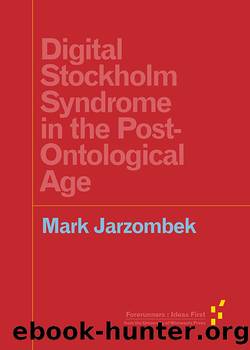Digital Stockholm Syndrome in the Post-Ontological Age by Mark Jarzombek

Author:Mark Jarzombek [Jarzombek, Mark]
Language: eng
Format: epub
Tags: PHI000000 Philosophy / General
ISBN: 978-1-4529-5383-0
Publisher: University of Minnesota Press
Published: 2016-07-08T00:00:00+00:00
Unfortunately, even with the help of as powerful an instrument as space syntax, there are still hidden analytic dangers lurking just below the surface, especially at the larger scales of analysis.[21]
If the deities of old told us that they made us from clay, at least back then, we were One Thing. Todayâs polytheistic deities have no interest in making us One Thing. We are fashioned out of a wide range of algorithmic languages, some made just a few seconds ago, others hanging around like sleeper cells in our ontological DNA, maybe working, maybe not, maybe waking up one day in a desperate attempt at survival. This algorithmic montageâdesigned to be invisible on the surface of Beingâfakes the attempt to be our seamless companion. And yet, in this approximation, we see ourselves revealed, but only as models, both formed and trapped in a modeled/modeling identity.
Being-Global does not preach about improving ourselves, improving others. That is a question of content. Content and Being have been freely and guiltlessly disconnected for the first time in human history to provide space for the self-militarization of the human/civilian. Being-Global does not proclaim the straight and narrow, nor does it proclaim dissolution. It is not the hated technology of old, the technology that would make us inhuman in the traditional sense of that word. It gives us the opportunity to be as human as we want, depending on how one defines that word. Pornographers played a key role in the development of open content, technically and legally; hackers played a key role in exposing bad actors; nation-states operate ceaselessly to create disinformation.
A Being-Global person has no outsideâa no-outside without identifiable ideology. A person is called to subjectivity without that call ever taking shape as an outside. The techniques of participation are naturalized too soon, too quicklyânow almost at birth. Being-Global in that sense is not political. All politics belong to the spin cycles/gyroscopes of global outflows/inflows. Being-Global is not liberal and not conservative. One âfollows.â Being-Global is not just living in a personalized community. It is not just participating at some scale or other in a vast chemomathematical industry of cultural production. It produces tribal, national, transnational, communities of its own. Whatever politics you have in all this is potentially embraced in the post-ontological world, yet subject to its various laws of thermodynamics.
The post-ontological does not proclaim itself as avant-garde, as something leading up to change. That myth died with the modernists and onto-centric survivors/survivalists/revivalists. Though any individual can play out onto-centric fantasies, we live in a world that is too porous for full epistemic/corporeal/sensate closure.
Being-in-the-world was once all about the struggle for recognition, a struggle theorized and grounded in religion and philosophy. Hegel wanted us to be identified with the State. He wanted us to be National Beings, solid and predictableâgood citizens, all. We still live in the moving disaster of that worldview. Derrida wanted to critique this. He called it âdeconstruction.â But to deconstruct, you need to readâread wellâread Plato again and again over a lifetime! Good for him, but it does not scale up.
Download
This site does not store any files on its server. We only index and link to content provided by other sites. Please contact the content providers to delete copyright contents if any and email us, we'll remove relevant links or contents immediately.
Sapiens: A Brief History of Humankind by Yuval Noah Harari(14389)
Sapiens by Yuval Noah Harari(5370)
Pale Blue Dot by Carl Sagan(5008)
Homo Deus: A Brief History of Tomorrow by Yuval Noah Harari(4918)
Livewired by David Eagleman(3772)
Origin Story: A Big History of Everything by David Christian(3692)
Brief Answers to the Big Questions by Stephen Hawking(3435)
Inferior by Angela Saini(3314)
Origin Story by David Christian(3201)
Signature in the Cell: DNA and the Evidence for Intelligent Design by Stephen C. Meyer(3138)
The Gene: An Intimate History by Siddhartha Mukherjee(3098)
The Evolution of Beauty by Richard O. Prum(2997)
Aliens by Jim Al-Khalili(2829)
How The Mind Works by Steven Pinker(2816)
A Short History of Nearly Everything by Bryson Bill(2698)
Sex at Dawn: The Prehistoric Origins of Modern Sexuality by Ryan Christopher(2529)
From Bacteria to Bach and Back by Daniel C. Dennett(2484)
Endless Forms Most Beautiful by Sean B. Carroll(2482)
Who We Are and How We Got Here by David Reich(2437)
